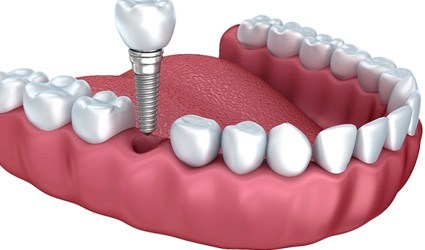Dental Implant Salvage
Painful or Loose Implants? Let Us Help

After your implant placement surgery, you should pay close attention to your new teeth and how they feel. If you suddenly notice constant pain or another worrisome symptom, call Park City Dentistry immediately for treatment. Dr. Calderwood is a Fellow of ICOI (International Congress of Oral Implantologists) and has years of training and experience working with implants; he can quickly get to the bottom of your implant-related pain and find a solution that will ultimately leave you grinning again.
Why Choose Park City Dentistry for Dental Implant Salvage?
- ICOI Fellow with Extensive Experience
- Efficient Care with State-of-the-Art Technology
- Sedation Available for Any Procedure
Why Do Dental Implants Fail?

Dental implant problems are quite rare, but sometimes they can come loose, crack, or even fall off altogether. These issues may mean that osseointegration – the natural process of the jawbone joining with the titanium posts – either wasn’t properly completed or didn’t occur at all. In other cases, gum disease or another infection could have caused the bone to deteriorate, causing the implant to become unstable. And of course, there’s always the chance that implants will break if you suddenly get hit in the mouth.
The above complications could arise shortly after you receive your implants. However, sometimes a problem won’t occur until years after the initial surgery. Either way, you’ll need to act quickly if you notice anything wrong with your implants.
What are the Symptoms of Failed Dental Implants?

- Movement of the Implant Posts: Because of the way implants join with the jawbone, they should not feel loose or move at all. If they wiggle or shift even slightly when you touch them, it likely means that osseointegration has failed and bone loss has occurred.
- Difficulty Chewing: Once your mouth has fully healed, implants allow you to eat all kinds of foods. However, a failed implant will generally make it harder to chew, and you might struggle with meals that didn’t present any kind of problems in the past.
- Inflamed, Swollen, or Bleeding Gums: Peri-implantitis is a specific form of gum disease that is responsible for many different implant complications. Gum tissue that looks redder or more swollen than usual could be infected. They might also bleed more easily whenever you brush or floss.
- Severe Pain or Discomfort: Pain that goes beyond the normal levels of discomfort that you’d normally expect during recover should be taken as a sign that something is wrong. This is especially true if it occurs long after your mouth should have healed.
How Does Dental Implant Salvage Work?

The salvage process depends on what part of the implant needs to be repaired. If only the restoration (the artificial tooth) was broken, it can simply be repaired or replaced. This type of complication is the easiest to deal with since it doesn’t involve any sort of invasive treatment.
However, if the implant post itself was damaged or has failed to join with the jaw, a more in-depth treatment is needed. After we examine your mouth and diagnose the problem, Dr. Calderwood will carefully remove the implant post from your mouth. At that point, you might receive a bone graft to add density to the jaw and prevent further bone loss. Gum disease therapy might also be required if peri-implantitis did occur. These treatments typically take time to complete, but once your mouth has fully healed, we can restart the process with new implants.


